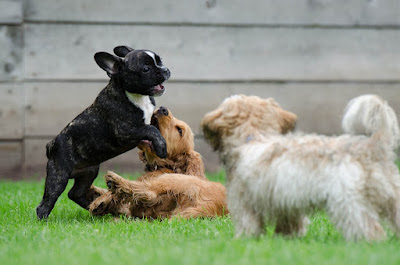Socializing is the basis of the future Behavior
(from http://caninotreino.wixsite.com/treinocanino) |
| Socializing is the basis of the future Behavior |
People are sometimes warned not to bring their puppies in public until they are completely vaccinated for fear the dog will get sick. But times have changed and most veterinarians, trainers, breeders, and behaviorists recommend that you start socializing your puppy early. A non-socialized dog is more likely to have long-term behavior problems than to become ill while interacting with other dogs.
You should rather balance medical risk with behavioral risks, which is why uncontrolled areas such as dog parks and beaches should be avoided until the dog is fully vaccinated. But the risk of socializing your puppy in a controlled environment where dogs do not run loose is minimal.
Age - The best age to socialize a puppy is between two and four months of age. After four months of age, the window of socialization begins to close and it is much more difficult to include the opinion and attitude of a puppy.
For example, if a dog is not exposed to traffic before four months of age it can become so paralyzed with fear of images and sounds that walking on a city street may be impossible or at best uncomfortable. If the dog is exposed to traffic before four months of age and introduced in a positive way, he will be delighted to walk along a city street because it was a positive encounter. Dog behavior training should start early in your life.
Researchers on dog behavior found that puppies that are isolated from human contact between five and twelve weeks of age are never able to react normally to people later in life. This age is the "sensitive" period of a puppy and the weeks of the sensitive period may vary. Make sure your pet has many positive experiences of human contact during this time.
So where and when do you start doing your socializing?
Start at home - As soon as you bring your puppy home, visit the veterinarian to check on your health. If that's okay, start by acclimatizing your puppy to the sounds, smells and landscapes of your new environment - your home. After a few days leave the city and start your socialization program.
In town - Carry your dog around town, bring several treats, and ask anyone who wants to meet your dog to offer you a surprise. Do not put your puppy on the ground yet, but carrying it is perfectly safe. You want your dog to think that loud noises, funny odors and silly citizens walking the streets is perfectly normal!
Traffic - Does a firefighter siren pass you by? Give a treat and look happy! Truck or Bus? Give a treat and act like a fool! This will cause your puppy to become accustomed to all the potentially frightening noises and things that he or she will inevitably encounter. If you expose your puppy to street traffic sounds in a positive way (with goodies and joy), he'll be comfortable walking down the street with you.Children. If you do not have children, it is important that you look for children so that you can socialize your puppy. Children are more unpredictable and have quick hand movements. The puppies that are not exposed to children may be afraid of them.
Scary Situations - Be careful not to pay too much attention if your puppy gets scared in a situation that is normal. If a bike runs past you and your puppy, you will be tempted to reassure him by saying that "it's okay, you're fine, fine." What your little animal might well hear is, "Good boy, Mommy loves it when you're scared, please, keep going!" It is best to simply reward him with a treat and move on. When the next bike passes by, offer a food reward for the dog so that he redirects his thoughts from fear to reward. Puppies cherish food, so do not be afraid to offer them as a reward.